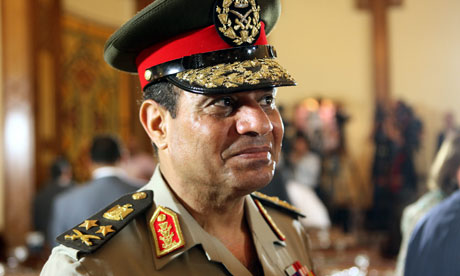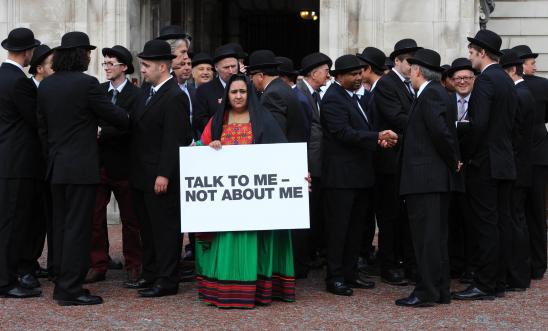Last week, Egypt’s foreign minister arrived at the UN in New York and signalled a return to democracy in Egypt by announcing that his country’s transitional phase would be concluded by spring of next year, following parliamentary, and then presidential elections.
As pundits race to identify contenders, a serious movement to nominate Egypt’s highest general, Abdel Fattah al-Sisi, has surfaced. General al-Sisi’s leadership is contested among Muslim Brotherhood supporters, following the general’s controversial July 3 deposition of former president Mohammad Morsi. But for many Egyptians, the pragmatic and reliable military leadership of General al-Sisi is a blessing, albeit an unelected one. General al-Sisi has so far remained aloof about a run for elected office, but he may be obliged to do so if his most ardent allies have a say in the matter. The general’s supporters recently launched a bold plan to raise 30 million petition signatures in an attempt to compel Egypt’s top commander to ‘complete his favour’ by running in next year’s presidential elections.
The “Complete Your Favour” petition may be nothing more than a clever public relations campaign fomented by al-Sisi’s inner circle, and disguised as a popular campaign, but it has thrown open the door for Gen. al-Sisi’s political career. As calls to elect the military leader grow, it is crucial to examine the pragmatic commander’s past and consider what it means for Egypt’s future.
[captionpix align=”left” theme=”elegant” width=”300″ imgsrc=”http://natoassociation.ca/wp-content/uploads/2013/10/167312354_1.jpg
” captiontext=”Abdel Fattah al-Sisi with Secretary of Defense Chuck Hagel”]
An Enigmatic Character
Far from being the American puppet that many of Gen. al-Sisi opponents have decried him as, Egypt’s top commander is anything but predictable. Born in 1954, Abdel Fattah al-Sisi quickly found that the army, in whose ranks he rapidly rose, was one the few avenues of upward mobility available to middle-class Egyptians. Intelligent and ambitious, al-Sisi was selected to study in the United Kingdom at Staff College, and then again at War College in Pennsylvania during 2005, where he completed his Masters.
As a rather mature grad student, al-Sisi wrote a now much analyzed essay, curiously entitled “Democracy in the Middle East”. Despite the paper’s seemingly encouraging title, opinion over its message been divided. It is difficult to judge just how indicative the paper is of al-Sisi’s true thinking, but his writing does sharply criticize US foreign policy in the region, and more provocatively, Gen. al-Sisi questions whether the international community could accept a new form of democracy that was blended with elements of Islamic tradition. Indeed, Gen. al-Sisi himself is said to be religious, but also a strong admirer of Egypt’s secular nationalist president Gamal Abdel Nasser.
General al-Sisi rarely ever speaks to reporters and it is clear that the budding strongman has worked to control the stream of information about his family and his past. Maintaining this veil of opaqueness has provided him with a reputation for objectivity that he has worked hard to cultivate. In fact, Gen. al-Sisi appears acutely concerned with his image, both domestically and abroad. In the run up to the coup that felled the Muslim Brotherhood government, Gen. al-Sisi was seen by many to have purposely allowed some of the civil demonstrations to escalate. According to some analysts, by allowing the anti-Morsi protests to grow, al-Sisi was only giving himself greater moral authority to intervene at the last moment, acting as a reluctant but obligated leader, selflessly following the will of the Egyptian people.
A Future Leader?
Regardless of his motives, the dexterity that al-Sisi displayed in controlling and directing the flow of popular anger against the Morsi administration should be interpreted as an indication that Gen. al-Sisi is as much a capable statesman as he is a military leader. After all, it was the military, headed by Gen. al-Sisi, which tactfully worked behind the scenes, maintaining the all-important Camp David Accords and silently cooperating with Israel in diligently fighting the growing extremist element in the Sinai Peninsula.
General al-Sisi has so far used a patient and calculated approach to keep the military as the main stabilizing force in post-Morsi Egypt, but the resurgence of the Muslim Brotherhood and Salafist parties may come to challenge his position. The announcement of elections next year optimistically serves as a sign that Egypt is on the path to substantive democracy. But as the international community ponders what form this budding democracy will take, it would be difficult to imagine a future in which the quiet but pragmatic General al-Sisi does not play a central role.



